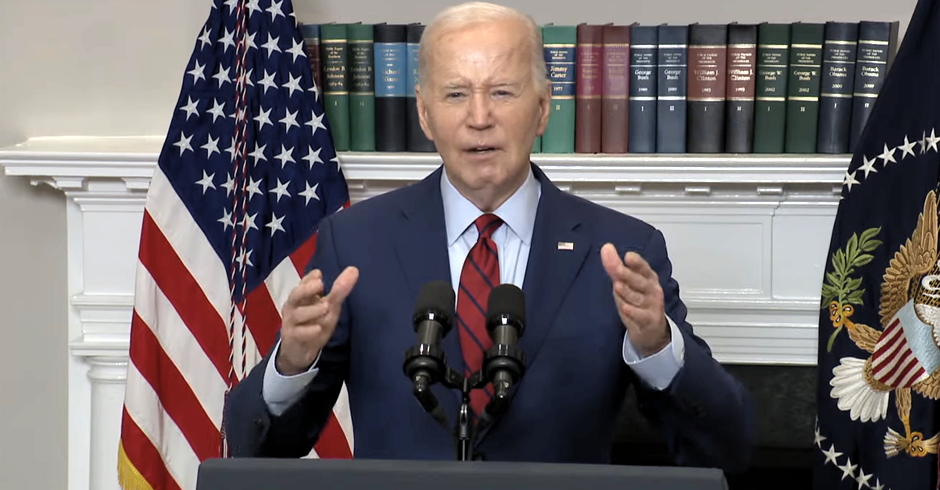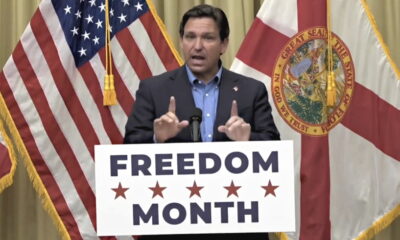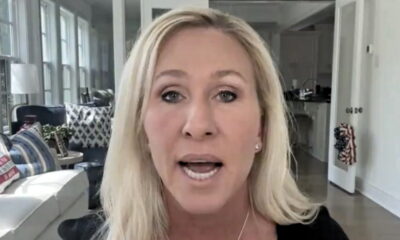Obama’s Middle East Speech — Complete Text
Â
Â
Â
Â
THE WHITE HOUSE
Office of the Press Secretary
May 19, 2011
Â
Remarks of President Barack Obama
“A Moment of Opportunityâ€
U.S. Department of State
May 19, 2011
Â
As Prepared for Delivery –
Â
I want to thank Hillary Clinton, who has traveled so much these last six months that she is approaching a new landmark – one million frequent flyer miles. I count on Hillary every day, and I believe that she will go down as of the finest Secretaries of State in our nation’s history.
Â
The State Department is a fitting venue to mark a new chapter in American diplomacy. For six months, we have witnessed an extraordinary change take place in the Middle East and North Africa. Square by square; town by town; country by country; the people have risen up to demand their basic human rights. Two leaders have stepped aside. More may follow. And though these countries may be a great distance from our shores, we know that our own future is bound to this region by the forces of economics and security; history and faith.
Â
Today, I would like to talk about this change – the forces that are driving it, and how we can respond in a way that advances our values and strengthens our security. Already, we have done much to shift our foreign policy following a decade defined by two costly conflicts. After years of war in Iraq, we have removed 100,000 American troops and ended our combat mission there. In Afghanistan, we have broken the Taliban’s momentum, and this July we will begin to bring our troops home and continue transition to Afghan lead. And after years of war against al Qaeda and its affiliates, we have dealt al Qaeda a huge blow by killing its leader – Osama bin Laden.
Â
Bin Laden was no martyr. He was a mass murderer who offered a message of hate – an insistence that Muslims had to take up arms against the West, and that violence against men, women and children was the only path to change. He rejected democracy and individual rights for Muslims in favor of violent extremism; his agenda focused on what he could destroy – not what he could build.
Â
Bin Laden and his murderous vision won some adherents. But even before his death, al Qaeda was losing its struggle for relevance, as the overwhelming majority of people saw that the slaughter of innocents did not answer their cries for a better life. By the time we found bin Laden, al Qaeda’s agenda had come to be seen by the vast majority of the region as a dead end, and the people of the Middle East and North Africa had taken their future into their own hands.
Â
That story of self-determination began six months ago in Tunisia. On December 17, a young vendor named Mohammed Bouazizi was devastated when a police officer confiscated his cart. This was not unique. It is the same kind of humiliation that takes place every day in many parts of the world – the relentless tyranny of governments that deny their citizens dignity. Only this time, something different happened. After local officials refused to hear his complaint, this young man who had never been particularly active in politics went to the headquarters of the provincial government, doused himself in fuel, and lit himself on fire.
Â
Sometimes, in the course of history, the actions of ordinary citizens spark movements for change because they speak to a longing for freedom that has built up for years. In America, think of the defiance of those patriots in Boston who refused to pay taxes to a King, or the dignity of Rosa Parks as she sat courageously in her seat. So it was in Tunisia, as that vendor’s act of desperation tapped into the frustration felt throughout the country. Hundreds of protesters took to the streets, then thousands. And in the face of batons and sometimes bullets, they refused to go home – day after day, week after week, until a dictator of more than two decades finally left power.
Â
The story of this Revolution, and the ones that followed, should not have come as a surprise. The nations of the Middle East and North Africa won their independence long ago, but in too many places their people did not. In too many countries, power has been concentrated in the hands of the few. In too many countries, a citizen like that young vendor had nowhere to turn – no honest judiciary to hear his case; no independent media to give him voice; no credible political party to represent his views; no free and fair election where he could choose his leader.
Â
This lack of self determination – the chance to make of your life what you will – has applied to the region’s economy as well. Yes, some nations are blessed with wealth in oil and gas, and that has led to pockets of prosperity. But in a global economy based on knowledge and innovation, no development strategy can be based solely upon what comes out of the ground. Nor can people reach their potential when you cannot start a business without paying a bribe.
Â
In the face of these challenges, too many leaders in the region tried to direct their people’s grievances elsewhere. The West was blamed as the source of all ills, a half century after the end of colonialism. Antagonism toward Israel became the only acceptable outlet for political expression. Divisions of tribe, ethnicity and religious sect were manipulated as a means of holding on to power, or taking it away from somebody else.
Â
But the events of the past six months show us that strategies of repression and diversion won’t work anymore. Satellite television and the Internet provide a window into the wider world – a world of astonishing progress in places like India, Indonesia and Brazil. Cell phones and social networks allow young people to connect and organize like never before. A new generation has emerged. And their voices tell us that change cannot be denied.
Â
In Cairo, we heard the voice of the young mother who said, “It’s like I can finally breathe fresh air for the first time.â€
Â
In Sanaa, we heard the students who chanted, “The night must come to an end.â€
Â
In Benghazi, we heard the engineer who said, “Our words are free now. It’s a feeling you can’t explain.â€
Â
In Damascus, we heard the young man who said, “After the first yelling, the first shout, you feel dignity.â€
Â
Those shouts of human dignity are being heard across the region. And through the moral force of non-violence, the people of the region have achieved more change in six months than terrorists have accomplished in decades.
Â
Of course, change of this magnitude does not come easily. In our day and age – a time of 24 hour news cycles, and constant communication – people expect the transformation of the region to be resolved in a matter of weeks. But it will be years before this story reaches its end. Along the way, there will be good days, and bad days. In some places, change will be swift; in others, gradual. And as we have seen, calls for change may give way to fierce contests for power.
Â
The question before us is what role America will play as this story unfolds. For decades, the United States has pursued a set of core interests in the region: countering terrorism and stopping the spread of nuclear weapons; securing the free flow of commerce, and safe-guarding the security of the region; standing up for Israel’s security and pursuing Arab-Israeli peace.
Â
We will continue to do these things, with the firm belief that America’s interests are not hostile to peoples’ hopes; they are essential to them. We believe that no one benefits from a nuclear arms race in the region, or al Qaeda’s brutal attacks. People everywhere would see their economies crippled by a cut off in energy supplies. As we did in the Gulf War, we will not tolerate aggression across borders, and we will keep our commitments to friends and partners.
Â
Yet we must acknowledge that a strategy based solely upon the narrow pursuit of these interests will not fill an empty stomach or allow someone to speak their mind. Moreover, failure to speak to the broader aspirations of ordinary people will only feed the suspicion that has festered for years that the United States pursues our own interests at their expense. Given that this mistrust runs both ways – as Americans have been seared by hostage taking, violent rhetoric, and terrorist attacks that have killed thousands of our citizens – a failure to change our approach threatens a deepening spiral of division between the United States and Muslim communities.
Â
That’s why, two years ago in Cairo, I began to broaden our engagement based upon mutual interests and mutual respect. I believed then – and I believe now – that we have a stake not just in the stability of nations, but in the self determination of individuals. The status quo is not sustainable. Societies held together by fear and repression may offer the illusion of stability for a time, but they are built upon fault lines that will eventually tear asunder.
Â
So we face an historic opportunity. We have embraced the chance to show that America values the dignity of the street vendor in Tunisia more than the raw power of the dictator. There must be no doubt that the United States of America welcomes change that advances self-determination and opportunity. Yes, there will be perils that accompany this moment of promise. But after decades of accepting the world as it is in the region, we have a chance to pursue the world as it should be.
Â
As we do, we must proceed with a sense of humility. It is not America that put people into the streets of Tunis and Cairo – it was the people themselves who launched these movements, and must determine their outcome. Not every country will follow our particular form of representative democracy, and there will be times when our short term interests do not align perfectly with our long term vision of the region. But we can – and will – speak out for a set of core principles – principles that have guided our response to the events over the past six months:
Â
The United States opposes the use of violence and repression against the people of the region.
Â
We support a set of universal rights. Those rights include free speech; the freedom of peaceful assembly; freedom of religion; equality for men and women under the rule of law; and the right to choose your own leaders – whether you live in Baghdad or Damascus; Sanaa or Tehran.
Â
And finally, we support political and economic reform in the Middle East and North Africa that can meet the legitimate aspirations of ordinary people throughout the region.
Â
Our support for these principles is not a secondary interest– today I am making it clear that it is a top priority that must be translated into concrete actions, and supported by all of the diplomatic, economic and strategic tools at our disposal.
Â
Let me be specific. First, it will be the policy of the United States to promote reform across the region, and to support transitions to democracy.
Â
That effort begins in Egypt and Tunisia, where the stakes are high –as Tunisia was at the vanguard of this democratic wave, and Egypt is both a longstanding partner and the Arab World’s largest nation. Both nations can set a strong example through free and fair elections; a vibrant civil society; accountable and effective democratic institutions; and responsible regional leadership. But our support must also extend to nations where transitions have yet to take place.
Â
Unfortunately, in too many countries, calls for change have been answered by violence. The most extreme example is Libya, where Moammar Gaddafi launched a war against his people, promising to hunt them down like rats. As I said when the United States joined an international coalition to intervene, we cannot prevent every injustice perpetrated by a regime against its people, and we have learned from our experience in Iraq just how costly and difficult it is to impose regime change by force – no matter how well-intended it may be.
Â
But in Libya, we saw the prospect of imminent massacre, had a mandate for action, and heard the Libyan people’s call for help. Had we not acted along with our NATO allies and regional coalition partners, thousands would have been killed. The message would have been clear: keep power by killing as many people as it takes. Now, time is working against Gaddafi. He does not have control over his country. The opposition has organized a legitimate and credible Interim Council. And when Gaddafi inevitably leaves or is forced from power, decades of provocation will come to an end, and the transition to a democratic Libya can proceed.
Â
While Libya has faced violence on the greatest scale, it is not the only place where leaders have turned to repression to remain in power. Most recently, the Syrian regime has chosen the path of murder and the mass arrests of its citizens. The United States has condemned these actions, and working with the international community we have stepped up our sanctions on the Syrian regime – including sanctions announced yesterday on President Assad and those around him.
Â
The Syrian people have shown their courage in demanding a transition to democracy. President Assad now has a choice: he can lead that transition, or get out of the way. The Syrian government must stop shooting demonstrators and allow peaceful protests; release political prisoners and stop unjust arrests; allow human rights monitors to have access to cities like Dara’a; and start a serious dialogue to advance a democratic transition. Otherwise, President Assad and his regime will continue to be challenged from within and isolated abroad
Â
Thus far, Syria has followed its Iranian ally, seeking assistance from Tehran in the tactics of suppression. This speaks to the hypocrisy of the Iranian regime, which says it stand for the rights of protesters abroad, yet suppresses its people at home. Let us remember that the first peaceful protests were in the streets of Tehran, where the government brutalized women and men, and threw innocent people into jail. We still hear the chants echo from the rooftops of Tehran. The image of a young woman dying in the streets is still seared in our memory. And we will continue to insist that the Iranian people deserve their universal rights, and a government that does not smother their aspirations.
Â
Our opposition to Iran’s intolerance – as well as its illicit nuclear program, and its sponsorship of terror – is well known. But if America is to be credible, we must acknowledge that our friends in the region have not all reacted to the demands for change consistent with the principles that I have outlined today. That is true in Yemen, where President Saleh needs to follow through on his commitment to transfer power. And that is true, today, in Bahrain.
Â
Bahrain is a long-standing partner, and we are committed to its security. We recognize that Iran has tried to take advantage of the turmoil there, and that the Bahraini government has a legitimate interest in the rule of law. Nevertheless, we have insisted publically and privately that mass arrests and brute force are at odds with the universal rights of Bahrain’s citizens, and will not make legitimate calls for reform go away. The only way forward is for the government and opposition to engage in a dialogue, and you can’t have a real dialogue when parts of the peaceful opposition are in jail. The government must create the conditions for dialogue, and the opposition must participate to forge a just future for all Bahrainis.
Â
Indeed, one of the broader lessons to be drawn from this period is that sectarian divides need not lead to conflict. In Iraq, we see the promise of a multi-ethnic, multi-sectarian democracy. There, the Iraqi people have rejected the perils of political violence for a democratic process, even as they have taken full responsibility for their own security. Like all new democracies, they will face setbacks. But Iraq is poised to play a key role in the region if it continues its peaceful progress. As they do, we will be proud to stand with them as a steadfast partner.
Â
So in the months ahead, America must use all our influence to encourage reform in the region. Even as we acknowledge that each country is different, we will need to speak honestly about the principles that we believe in, with friend and foe alike. Our message is simple: if you take the risks that reform entails, you will have the full support of the United States. We must also build on our efforts to broaden our engagement beyond elites, so that we reach the people who will shape the future – particularly young people.
Â
We will continue to make good on the commitments that I made in Cairo – to build networks of entrepreneurs, and expand exchanges in education; to foster cooperation in science and technology, and combat disease. Across the region, we intend to provide assistance to civil society, including those that may not be officially sanctioned, and who speak uncomfortable truths. And we will use the technology to connect with – and listen to – the voices of the people.
Â
In fact, real reform will not come at the ballot box alone. Through our efforts we must support those basic rights to speak your mind and access information. We will support open access to the Internet, and the right of journalists to be heard – whether it’s a big news organization or a blogger. In the 21st century, information is power; the truth cannot be hidden; and the legitimacy of governments will ultimately depend on active and informed citizens.
Â
Such open discourse is important even if what is said does not square with our worldview. America respects the right of all peaceful and law-abiding voices to be heard, even if we disagree with them. We look forward to working with all who embrace genuine and inclusive democracy. What we will oppose is an attempt by any group to restrict the rights of others, and to hold power through coercion – not consent. Because democracy depends not only on elections, but also strong and accountable institutions, and respect for the rights of minorities.
Â
Such tolerance is particularly important when it comes to religion. In Tahrir Square, we heard Egyptians from all walks of life chant, “Muslims, Christians, we are one.†America will work to see that this spirit prevails – that all faiths are respected, and that bridges are built among them. In a region that was the birthplace of three world religions, intolerance can lead only to suffering and stagnation. And for this season of change to succeed, Coptic Christians must have the right to worship freely in Cairo, just as Shia must never have their mosques destroyed in Bahrain.
Â
What is true for religious minorities is also true when it comes to the rights of women. History shows that countries are more prosperous and peaceful when women are empowered. That is why we will continue to insist that universal rights apply to women as well as men – by focusing assistance on child and maternal health; by helping women to teach, or start a business; by standing up for the right of women to have their voices heard, and to run for office. For the region will never reach its potential when more than half its population is prevented from achieving their potential.
Â
Even as we promote political reform and human rights in the region, our efforts cannot stop there. So the second way that we must support positive change in the region is through our efforts to advance economic development for nations that transition to democracy.
Â
After all, politics alone has not put protesters into the streets. The tipping point for so many people is the more constant concern of putting food on the table and providing for a family. Too many in the region wake up with few expectations other than making it through the day, and perhaps the hope that their luck will change. Throughout the region, many young people have a solid education, but closed economies leave them unable to find a job. Entrepreneurs are brimming with ideas, but corruption leaves them unable to profit from them.
Â
The greatest untapped resource in the Middle East and North Africa is the talent of its people. In the recent protests, we see that talent on display, as people harness technology to move the world. It’s no coincidence that one of the leaders of Tahrir Square was an executive for Google. That energy now needs to be channeled, in country after country, so that economic growth can solidify the accomplishments of the street. Just as democratic revolutions can be triggered by a lack of individual opportunity, successful democratic transitions depend upon an expansion of growth and broad-based prosperity.
Â
Drawing from what we’ve learned around the world, we think it’s important to focus on trade, not just aid; and investment, not just assistance. The goal must be a model in which protectionism gives way to openness; the reigns of commerce pass from the few to the many, and the economy generates jobs for the young. America’s support for democracy will therefore be based on ensuring financial stability; promoting reform; and integrating competitive markets with each other and the global economy – starting with Tunisia and Egypt.
Â
First, we have asked the World Bank and the International Monetary Fund to present a plan at next week’s G-8 summit for what needs to be done to stabilize and modernize the economies of Tunisia and Egypt. Together, we must help them recover from the disruption of their democratic upheaval, and support the governments that will be elected later this year. And we are urging other countries to help Egypt and Tunisia meet its near-term financial needs.
Â
Second, we do not want a democratic Egypt to be saddled by the debts of its past. So we will relieve a democratic Egypt of up to $1 billion in debt, and work with our Egyptian partners to invest these resources to foster growth and entrepreneurship. We will help Egypt regain access to markets by guaranteeing $1 billion in borrowing that is needed to finance infrastructure and job creation. And we will help newly democratic governments recover assets that were stolen.
Â
Third, we are working with Congress to create Enterprise Funds to invest in Tunisia and Egypt. These will be modeled on funds that supported the transitions in Eastern Europe after the fall of the Berlin Wall. OPIC will soon launch a $2 billion facility to support private investment across the region. And we will work with allies to refocus the European Bank for Reconstruction and Development so that it provides the same support for democratic transitions and economic modernization in the Middle East and North Africa as it has in Europe.
Â
Fourth, the United States will launch a comprehensive Trade and Investment Partnership Initiative in the Middle East and North Africa. If you take out oil exports, this region of over 400 million people exports roughly the same amount as Switzerland. So we will work with the EU to facilitate more trade within the region, build on existing agreements to promote integration with U.S. and European markets, and open the door for those countries who adopt high standards of reform and trade liberalization to construct a regional trade arrangement. Just as EU membership served as an incentive for reform in Europe, so should the vision of a modern and prosperous economy create a powerful force for reform in the Middle East and North Africa.
Â
Prosperity also requires tearing down walls that stand in the way of progress – the corruption of elites who steal from their people; the red tape that stops an idea from becoming a business; the patronage that distributes wealth based on tribe or sect. We will help governments meet international obligations, and invest efforts anti-corruption; by working with parliamentarians who are developing reforms, and activists who use technology to hold government accountable.
Â
Let me conclude by talking about another cornerstone of our approach to the region, and that relates to the pursuit of peace.
Â
For decades, the conflict between Israelis and Arabs has cast a shadow over the region. For Israelis, it has meant living with the fear that their children could get blown up on a bus or by rockets fired at their homes, as well as the pain of knowing that other children in the region are taught to hate them. For Palestinians, it has meant suffering the humiliation of occupation, and never living in a nation of their own. Moreover, this conflict has come with a larger cost the Middle East, as it impedes partnerships that could bring greater security, prosperity, and empowerment to ordinary people.
Â
My Administration has worked with the parties and the international community for over two years to end this conflict, yet expectations have gone unmet. Israeli settlement activity continues. Palestinians have walked away from talks. The world looks at a conflict that has grinded on for decades, and sees a stalemate. Indeed, there are those who argue that with all the change and uncertainty in the region, it is simply not possible to move forward.
Â
I disagree. At a time when the people of the Middle East and North Africa are casting off the burdens of the past, the drive for a lasting peace that ends the conflict and resolves all claims is more urgent than ever.
Â
For the Palestinians, efforts to delegitimize Israel will end in failure. Symbolic actions to isolate Israel at the United Nations in September won’t create an independent state. Palestinian leaders will not achieve peace or prosperity if Hamas insists on a path of terror and rejection. And Palestinians will never realize their independence by denying the right of Israel to exist.
Â
As for Israel, our friendship is rooted deeply in a shared history and shared values. Our commitment to Israel’s security is unshakeable. And we will stand against attempts to single it out for criticism in international forums. But precisely because of our friendship, it is important that we tell the truth: the status quo is unsustainable, and Israel too must act boldly to advance a lasting peace.
Â
The fact is, a growing number of Palestinians live west of the Jordan River. Technology will make it harder for Israel to defend itself. A region undergoing profound change will lead to populism in which millions of people – not just a few leaders – must believe peace is possible. The international community is tired of an endless process that never produces an outcome. The dream of a Jewish and democratic state cannot be fulfilled with permanent occupation.
Â
Ultimately, it is up to Israelis and Palestinians to take action. No peace can be imposed upon them, nor can endless delay make the problem go away. But what America and the international community can do is state frankly what everyone knows: a lasting peace will involve two states for two peoples. Israel as a Jewish state and the homeland for the Jewish people, and the state of Palestine as the homeland for the Palestinian people; each state enjoying self-determination, mutual recognition, and peace.
Â
So while the core issues of the conflict must be negotiated, the basis of those negotiations is clear: a viable Palestine, and a secure Israel. The United States believes that negotiations should result in two states, with permanent Palestinian borders with Israel, Jordan, and Egypt, and permanent Israeli borders with Palestine. The borders of Israel and Palestine should be based on the 1967 lines with mutually agreed swaps, so that secure and recognized borders are established for both states. The Palestinian people must have the right to govern themselves, and reach their potential, in a sovereign and contiguous state.
Â
As for security, every state has the right to self-defense, and Israel must be able to defend itself – by itself – against any threat. Provisions must also be robust enough to prevent a resurgence of terrorism; to stop the infiltration of weapons; and to provide effective border security. The full and phased withdrawal of Israeli military forces should be coordinated with the assumption of Palestinian security responsibility in a sovereign, non-militarized state. The duration of this transition period must be agreed, and the effectiveness of security arrangements must be demonstrated.
Â
These principles provide a foundation for negotiations. Palestinians should know the territorial outlines of their state; Israelis should know that their basic security concerns will be met. I know that these steps alone will not resolve this conflict. Two wrenching and emotional issues remain: the future of Jerusalem, and the fate of Palestinian refugees. But moving forward now on the basis of territory and security provides a foundation to resolve those two issues in a way that is just and fair, and that respects the rights and aspirations of Israelis and Palestinians.
Â
Recognizing that negotiations need to begin with the issues of territory and security does not mean that it will be easy to come back to the table. In particular, the recent announcement of an agreement between Fatah and Hamas raises profound and legitimate questions for Israel – how can one negotiate with a party that has shown itself unwilling to recognize your right to exist. In the weeks and months to come, Palestinian leaders will have to provide a credible answer to that question. Meanwhile, the United States, our Quartet partners, and the Arab states will need to continue every effort to get beyond the current impasse.
Â
I recognize how hard this will be. Suspicion and hostility has been passed on for generations, and at times it has hardened. But I’m convinced that the majority of Israelis and Palestinians would rather look to the future than be trapped in the past. We see that spirit in the Israeli father whose son was killed by Hamas, who helped start an organization that brought together Israelis and Palestinians who had lost loved ones. He said, “I gradually realized that the only hope for progress was to recognize the face of the conflict.†And we see it in the actions of a Palestinian who lost three daughters to Israeli shells in Gaza. “I have the right to feel angry,†he said. “So many people were expecting me to hate. My answer to them is I shall not hate…Let us hope,†he said, “for tomorrowâ€
Â
That is the choice that must be made – not simply in this conflict, but across the entire region – a choice between hate and hope; between the shackles of the past, and the promise of the future. It’s a choice that must be made by leaders and by people, and it’s a choice that will define the future of a region that served as the cradle of civilization and a crucible of strife.
Â
For all the challenges that lie ahead, we see many reasons to be hopeful. In Egypt, we see it in the efforts of young people who led protests. In Syria, we see it in the courage of those who brave bullets while chanting, ‘peaceful,’ ‘peaceful.’ In Benghazi, a city threatened with destruction, we see it in the courthouse square where people gather to celebrate the freedoms that they had never known. Across the region, those rights that we take for granted are being claimed with joy by those who are prying lose the grip of an iron fist.
Â
For the American people, the scenes of upheaval in the region may be unsettling, but the forces driving it are not unfamiliar. Our own nation was founded through a rebellion against an empire. Our people fought a painful civil war that extended freedom and dignity to those who were enslaved. And I would not be standing here today unless past generations turned to the moral force of non-violence as a way to perfect our union – organizing, marching, and protesting peacefully together to make real those words that declared our nation: “We hold these truths to be self evident, that all men are created equal.â€
Â
Those words must guide our response to the change that is transforming the Middle East and North Africa – words which tell us that repression will fail, that tyrants will fall, and that every man and woman is endowed with certain inalienable rights. It will not be easy. There is no straight line to progress, and hardship always accompanies a season of hope. But the United States of America was founded on the belief that people should govern themselves. Now, we cannot hesitate to stand squarely on the side of those who are reaching for their rights, knowing that their success will bring about a world that is more peaceful, more stable, and more just.
Â
###
Â

Enjoy this piece?
… then let us make a small request. The New Civil Rights Movement depends on readers like you to meet our ongoing expenses and continue producing quality progressive journalism. Three Silicon Valley giants consume 70 percent of all online advertising dollars, so we need your help to continue doing what we do.
NCRM is independent. You won’t find mainstream media bias here. From unflinching coverage of religious extremism, to spotlighting efforts to roll back our rights, NCRM continues to speak truth to power. America needs independent voices like NCRM to be sure no one is forgotten.
Every reader contribution, whatever the amount, makes a tremendous difference. Help ensure NCRM remains independent long into the future. Support progressive journalism with a one-time contribution to NCRM, or click here to become a subscriber. Thank you. Click here to donate by check.
 |






















